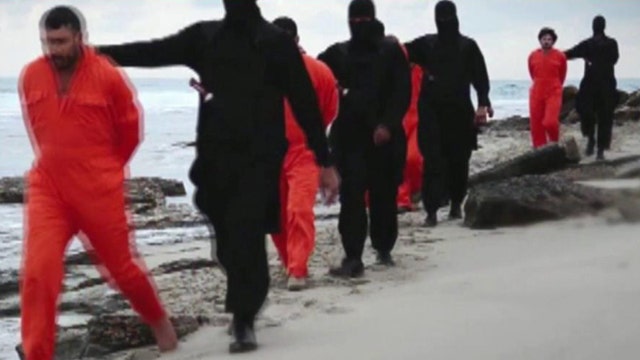Political Insiders Part 1: ISIS and the threat of terror
How does the U.S. response stack up to the rest of the world?
What the West really needs to take on the Islamic State is ... a jobs program.
That's what a top State Department spokeswoman suggested when asked in a TV interview Monday night about what the U.S.-led coalition is doing to stop the slaughter of civilians by Islamic State militants across the region.
"We're killing a lot of them, and we're going to keep killing more of them. ... But we cannot win this war by killing them," department spokeswoman Marie Harf said on MSNBC's "Hardball." "We need ... to go after the root causes that leads people to join these groups, whether it's lack of opportunity for jobs, whether --"
At that point, Harf was interrupted by host Chris Matthews, who pointed out, "There's always going to be poor people. There's always going to be poor Muslims."
Harf continued to argue that the U.S. should work with other countries to "help improve their governance" and "help them build their economies so they can have job opportunities for these people."
She acknowledged there's "no easy solution" and said the U.S. would still take out ISIS leaders. But Harf said: "If we can help countries work at the root causes of this -- what makes these 17-year-old kids pick up an AK-47 instead of trying to start a business?"
Asked about Harf's remarks on Tuesday, State Department spokeswoman Jen Psaki said Harf was only making the point that fighting ISIS entails more than just a military solution.
The comments come as the Obama administration takes heat from lawmakers for its approach to the Islamic State, whose self-proclaimed fighters in Libya recently executed 21 Coptic Christians from Egypt.
The White House on Tuesday kicked off a three-day summit on "countering violent extremism." It began with Vice President Biden moderating a discussion on countering extremism with representatives from cities.
This, though, follows a pattern of conferences and summits called by the administration to address urgent challenges. The administration is facing criticism for this approach -- and for describing the summit in general terms -- at a time when Islamic State militants are spreading, recruiting and executing prisoners from multiple countries in increasingly brutal ways.
"The White House had to seem like it was doing something," said Jonah Goldberg, a National Review editor and conservative columnist, while claiming the summit won't achieve much.
Senior administration officials, though, defended the conference, and their description of it, on a call with reporters.
Asked whether Islamic extremists are in fact the focus of the summit, one official said extremism has spanned "many decades" and taken on "many forms," but they recognize that those launching recent attacks "are calling themselves Muslims."
"You can call them what you want. We're calling them terrorists," the official said.
The New York Times reported Tuesday that as airstrikes continue in Iraq and Syria, the administration is boosting efforts to counter ISIS on social media. The plan centers around a small State Department agency that pushes against ISIS and other groups' online propaganda.
"We're getting beaten on volume, so the only way to compete is by aggregating, curating and amplifying existing content," Richard Stengel, under secretary of state for public diplomacy and public affairs, told the Times.
Officials reportedly plan to describe some of their social media strategy at the three-day counter-extremism summit.





